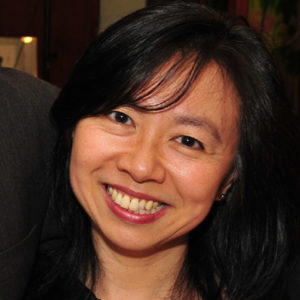By Clarence Leong

Amy Chin. Source: Gracie Mansion
Amy Chin’s paternal grandfather Bok Ying Chin came to the U.S. during a time, like our own, when the U.S. government was hostile toward immigrants. Grandfather Chin would later sponsor two more men to enter the country using the false identities of his sons—making them “paper sons” in the argot of Chinese Americans.
Amy Chin’s father was a real son of Grandfather Chin, yet her “paper uncle” Pang Ngip was not. In 1960s, the U.S. government encouraged “paper sons” to confess their false genealogy in exchange for amnesty and legal status. Pang Ngip came forward. What he told the interrogators, however, caused a family rift that would take years to heal. With particular resonance today, this is a story of a family that had lived and contributed to American society for many years, yet still had to fear for their right to stay.
Q: How did your paternal grandfather Bok Ying Chin become a U.S. citizen, and what motivated him to leave Toishan?
A: Grandfather Bok Ying entered the U.S. in 1913, claiming he was born in Napa, California but was taken back to China as a child. This may possibly be true, but it is unlikely. It was a story used by many Chinese immigrants of that period to get around the Chinese Exclusion laws and there was an organized network of labor recruiters, lawyers, transportation providers, government employees, paid witnesses, etc. who were complicit in the scheme.
I don’t know exactly why grandfather left Toishan, but probably it was the same reason as many of his generation – poverty and poor economic outlook in China and the allure of available work and riches in America. As I understand it, the family was not well off. According to my brother, Grandfather may have been a night soil collector in China. He was also the second son in the family, so according to traditional inheritance practices, he would not have gotten any land or money even if there was any.
Q: Why did your grandfather decide to sponsor a “paper son”?
A: I don’t know for sure why grandfather sponsored a “paper son.” In one family story I was told, his first son didn’t want to come to face a life of hard work in America, he was perfectly happy living off money that Grandfather was sending back home, and so Grandfather got angry and sold that son’s papers to someone else.
Grandfather also created an extra “paper son” slot by declaring that he had twin sons. He sold these papers to another man later. I suppose he did this to earn some money.
Q: What was your relationship with your “paper uncle” Pang Ngip?
A: I really didn’t know this “paper uncle” Pang Ngip. I may have met him when I was a child, but I don’t really remember him. He entered into the confession program in the 1960s and that caused problems for my dad and uncle later. The immigration service reasoned that if Pang Ngip is a paper son, how do we know if Bok Ying’s other sons are real or not. My father and uncle Pang Dick had to hire a lawyer and provide proof that they were Bok Ying’s real “blood” sons.
Funny thing is that there is a real uncle Pang Ngip. He is the son that didn’t want to come to America. The real Pang Ngip later immigrated to Canada. He couldn’t come to the U.S. because his papers had been sold to “paper” Pang Ngip. I met him once or twice and I’m in touch with some of his descendants who now live in Queens.
Q: Why did the “paper” Pang Ngip confess?
A: I believe that Pang Ngip’s motivation was to get his real last name back – a very important thing for Chinese. That would also enable him to bring real family members over to America.
The story I was told was that, in his interrogation, Pang Ngip was asked if Pang Fook (my dad) was Bok Ying’s real son or a paper son and he answered, “I don’t know.” This then triggered the investigation into my dad’s status. My mom and dad hated him for years because of this. They said he knew darn well that my dad was a real son and was a jerk for saying, “I don’t know.”
A few years ago, I got the actual government transcripts of Pang Ngip’s interrogation and found that he actually did say that my dad was a real son, but the interrogators hounded him into saying, “I don’t know.” They asked, “How do you know Pang Fook is a real son? Were you there when he was born? If not, then you don’t really know, do you?” Pretty crazy.
Q: Did your parents hire anybody else to work for them in the laundry shop?
A: My dad’s laundry was pretty successful. I’m told that it was one of the highest grossing Chinese laundries at its height. At one point, my dad had three storefronts. In addition to family members chipping in, he also hired other workers to help. I remember one older gentleman we called “Bald Head Uncle” – he was probably in his 70s, a veteran laundry worker, and didn’t have a family of his own.
It was long hours and tedious work, but it’s not as bad [as it sounds]. Early on, Chinese laundries in New York developed a system of outsourcing. The laundry was washed and pressed in bulk at outside factories. The work of the individual laundry owners was mainly to receive the laundry, sort it, send it out, then finish, re-sort and package the clean laundry when it comes back. Some small jobs may have been done by hand as well as starching and ironing, but most of it wasn’t done on-site.